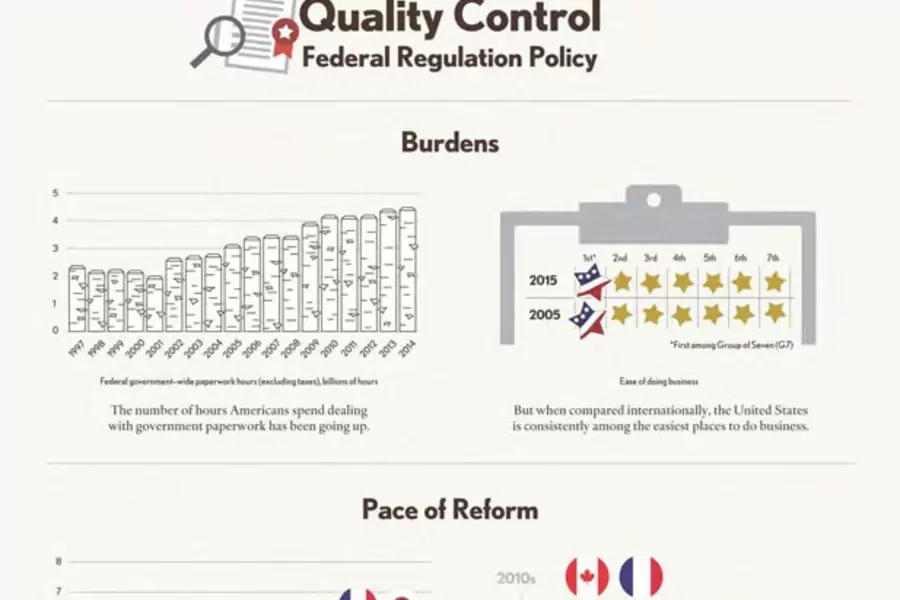Federal Regulations: Not "Job-Killing," But Still Costly

More on:
There are few issues in Washington today that generate more heat than regulations--that broad swathe of government actions that affect everything from air quality to worker safety. Congressional Republicans are promising to take aim at “job-killing regulations,” arguing that a rollback of onerous federal laws will boost U.S. economic competitiveness and spur job growth.
In a new Renewing America Progress Report released today--Quality Control: Federal Regulation Policy--my colleague Rebecca Strauss takes a deeper look at whether federal regulations are in fact impeding America’s economic competitiveness. The conclusions will be surprising to many. On balance, we found, the United States is not heavily regulated compared to its rich world competitors, but it does a poor job of updating and revising regulations to ensure that the burdens on business are not more onerous than they need to be. The United States does not, in most cases, need to regulate less, but it does need to regulate in a smarter fashion by getting rid of old rules that no longer serve their purpose.
Regulation is so ubiquitous that most of us are not even terribly aware of it. In the lunch room of my building here in Washington, for example, there are nearly a dozen glossy posters listing government regulations covering everything from minimum wages to labor laws to health care--but I have never seen anyone here actually take the time to read them. We buy food every day assuming that it’s perfectly safe to consume without recognizing that an elaborate regulatory system exists to make sure that’s actually the case; the only time we notice is when it fails, as it occasionally does in outbreaks of salmonella or E. coli. The new senator from North Carolina Thom Tillis (R-NC) recently drew a few raised eyebrows when he suggested that the regulation requiring restaurant employees to wash their hands after using the restroom was an unnecessary federal intrusion on business. I can’t say I had paid much attention to those signs before, but I do now.
The challenge with regulation is to make sure that businesses follow rules that are needed to ensure the health and safety of the public--like making sure those preparing our food have washed their hands--but to do so in a way that does not impose unnecessary costs on business.
Here are a few of the key findings from the report:
• U.S. businesses generally face less government regulation than their peers in other rich countries. World Bank and OECD data on regulatory burdens have ranked the United States consistently first or second among the large economies globally for being the easiest place to do business.
• The political rhetoric about “job killing” regulations is overblown. What studies exist have found both positive and negative effects on job creation, but they are generally small and usually localized.
• While the regulatory burden has been rising under the Obama administration, there is historically little difference between Democratic and Republican presidents on this issue. Going back to Jimmy Carter, every president has had nearly identical priorities and style of regulatory management.
• The costliest regulations are those concerned with the environment--limits on emissions, toxic chemicals, pollution and other restrictions on heavy industry. While small businesses complain the most about regulations--and understandably because the time costs of compliance can be high--the costs of environmental regulations fall most heavily on large companies.
• There have been presidential initiatives for decades trying to improve the overall quality of how the executive branch designs and updates regulations. Yet the system has scarcely changed in 35 years. In the 1970s and early 1980s, the United States used to be the global trailblazer on monitoring regulation levels and establishing some quality control for the regulation design process. But the rest of the rich world has since caught up, and other countries like the UK, Australia and Canada are now at the cutting-edge of regulatory management practices.
Finally, while the Republican voters are now far more likely than Democrats to say that the United States is over-regulated, opinion surveys also indicate the vast majority of voters in both parties support the current list of regulations when asked specifically about air quality or food safety or car emission standards.
Our broad conclusion is that the differences on regulation are not nearly as large as the political rhetoric would make it seem. As Rebecca Strauss writes in a companion piece published by Quartz, “there should be fertile ground here for the two parties to cooperate in creating a more streamlined regulatory system, one that protects Americans more and hurts its companies less.”
More on:
 Online Store
Online Store